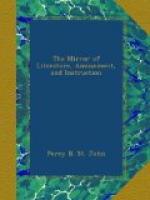Your correspondent, Enort, has certainly viewed the sunny side of his character; and that too I am disposed to think, with a burning glass. I have passed many hours in his society, pleased with his wit and epigrammatic sallies, but strive in vain to call to my recollection “the spontaneous flow of his Latin, his quotations from the ancient and modern poets, and his masterly and eloquent developement of every subject that his acute intellect chose to dilate upon.” His conversation was ever egotistical in the extreme: the bold assertion that his Lacon was the most clever work in the English language, was ever on his lips, and I regret to add, obscenity and irreligion too often supplied the place of wit or rational converse.
Palace Row, New Road.
W.W.
* * * * *
KING KENULPH’S DAUGHTER.
This is little better than a versified fact. The outline may be found in Sir Robert Atkyns’ History of Gloucestershire, p. 435.
King Kenulph he died, as kings have died,
The will of the Lord be done;
And he left to the care of his daughter
fair,
Queen Quendred, an infant
son.
The daughter gazed at her brother king,
Her eye had an evil mote;
And then she played with his yellow hair,
And patted his infant throat;
And then she muster’d a bloody mind,
And whisper’d a favour’d
slut,
While patting the infant monarch’s
throat,
It would not be much to cut.
The favour’d gipsey noted the hint,
And she thought it not amiss,
She hied to the infant’s governor,
And gave him a loving kiss.
The kiss of woman’s a wond’rous
juice,
That poisoneth pious minds,
It worketh more than the wrath of hell,
And the eye of justice blinds.
So they cut the infant monarch’s
throat,
They buried him in the wood,
The Mistress Quendred liv’d as a
queen,
And they thought the deed
was good.
Now mark, how ill is a crime conceal’d,
Bad deeds will never accord,
The murder never beheld at home,
Was to light elsewhere restor’d,
They wash’d their hands in the monarch’s
blood,
And the world roll’d
on the same,
Till swift to the holy shrine at Rome,
A fluttering dove there came.
A dove, a peaceful, timorous bird,
That carried a parchment scroll,
And in letters of gold, the crime it told,
That blasted a sister’s
soul.
That fluttering dove flew round the shrine,
Where the Pope by chance was
led,
And he let the scribbled parchment fall
On his holiness’ bald
head.
Now the Pope was very sore perplex’d,
At the words the dove had
scrawl’d,
For he could not read the pig-squeak tongue,
Which is now old English call’d.
He questioned the French ambassador,




